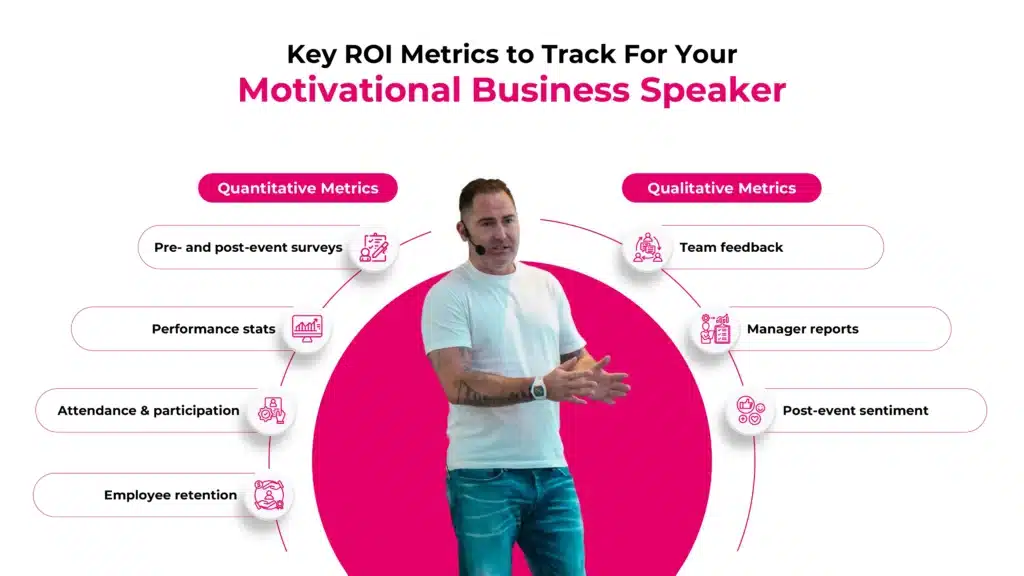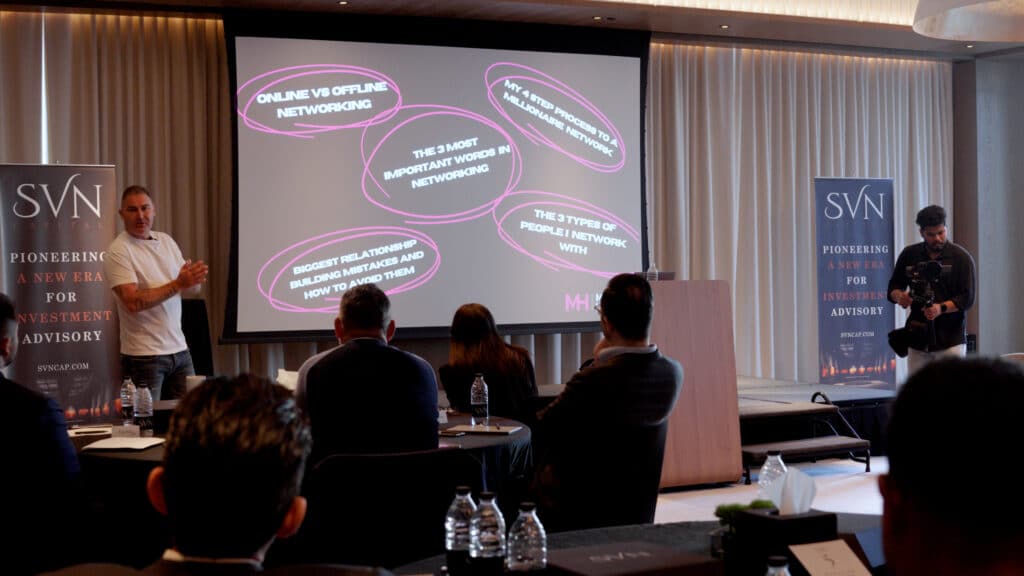Hiring a motivational business speaker is a popular strategy among companies aiming to inspire their teams, shift mindsets, or drive performance. But in a results-driven environment, many leaders rightly ask: How do I evaluate the ROI of hiring a motivational speaker?
In this article, we’ll explore practical, measurable ways to assess the real value of bringing in a motivational business speaker for your organisation event, whether it’s for a conference, team-building day, or leadership retreat.
What Does ROI Mean in This Context?
Return on Investment (ROI) typically refers to the financial return on an expense, but when it comes to motivational speakers, ROI extends far beyond pounds and pence. You’re investing in human capital: morale, engagement, focus, and inspiration.
The value may show up in hard metrics like increased sales or reduced turnover, but also in softer signals like renewed enthusiasm, sharper communication, and cultural alignment.
Common Goals When Hiring a Motivational Business Speaker
Different organisations have different reasons for hiring motivational business speakers. Understanding your intent is essential for measuring impact later. Common goals include:
- Boosting productivity across departments
- Re-engaging demotivated or remote teams
- Inspiring innovation and entrepreneurial thinking
- Enhancing leadership mindset
- Supporting cultural transformation
- Motivating staff post-restructuring or during growth phases
Key ROI Metrics to Track For Your Motivational Business Speaker
Let’s break down how to actually track ROI, using both quantitative and qualitative metrics.

Quantitative Metrics:
- Pre- and post-event surveys: Compare engagement or motivation levels.
- Performance stats: Did sales increase after a motivational sales talk? Are projects being completed faster?
- Attendance & participation: A packed room and high interactivity often indicate the speaker’s relevance and appeal.
- Employee retention: Track attrition rates over the next 3–6 months. Did things improve?
Qualitative Metrics:
- Team feedback: Are employees quoting the speaker’s insights days or weeks later?
- Manager reports: Do team leaders notice a change in tone, behaviour, or morale?
- Post-event sentiment: Is there a buzz around the office or in internal channels?
How to Set Measurable Objectives Pre-Event
Before the speaker steps on stage, get clear on what you’re hoping to achieve. Set realistic KPIs tied to the talk’s theme and the team’s current challenges.
For example:
- Increase sales performance by 10% over the next quarter
- Improve post-event engagement scores by 20%
- Spark new project ideas from 50% of attendees
To ensure you make informed decisions, read our key strategies for booking effective business speakers’ guides to get the best value for your team.
Why Setting Objectives For Your Motivational Business Speaker Matters
Too many businesses book a motivational speaker hoping for a “boost” without defining what success looks like. This vague approach makes it impossible to measure ROI effectively. By setting clear, measurable objectives:
- You create focus – both for the event organisers and the speaker.
- You ensure alignment – the speaker can tailor content that fits your strategic goals.
- You build accountability – KPIs give your team a framework to evaluate impact.
- You get buy-in – it’s easier to justify the budget to stakeholders when you’ve defined expected outcomes.
Ultimately, setting objectives helps transform a one-off motivational session into a business tool with real, tangible value.
Comparing Speaker Costs with Expected Outcomes
Speaker fees vary widely based on their reputation, location, and the type of event. In the UK, hiring a motivational speaker can range from £2,000 to £15,000+, depending on factors such as the speaker’s experience, background and quality of speech.
Let’s say your team brings in £500,000 in revenue quarterly. If a speaker helps motivate a 5% uplift in output, that’s a £25,000 return, on potentially a £5,000 spend.
Framing the investment in real, measurable terms helps justify the cost to stakeholders.
Red Flags: When the ROI of a Motivational Business Speaker Might Be Low
Even a charismatic speaker won’t move the needle if they’re not a good fit. Warning signs include:
- A generic presentation not tailored to your team
- Lack of understanding of your industry or business culture
- No pre-event prep or post-event materials
- Poor engagement during the talk
A poor match won’t just waste your budget, it can harm credibility. Vet carefully.
Enhancing ROI: Tips for Maximising Speaker Impact
To get the most out of your investment:
- Involve your leadership team in choosing and introducing the speaker
- Set context for employees before the event – why it matters
- Repurpose content: Record the talk for future use or internal sharing
- Reinforce key messages in meetings or follow-up sessions
Some speakers even offer add-ons like coaching, workshops, or downloadable resources to sustain momentum. Learn the top 10 qualities of impactful business speakers so you can make the best decision.
Conclusion
Evaluating the ROI of a motivational business speaker isn’t just possible, it’s essential. With clear objectives, relevant metrics, and the right speaker, your investment can spark lasting improvements in morale, performance, and business outcomes.
If you’re looking for a speaker who combines real-world business experience with straight-talking, motivational insight, look no further than Matt Haycox.

As a successful entrepreneur and investor, Matt brings more than just inspiration, he delivers actionable advice grounded in the realities of building, funding, and scaling businesses.
Whether you’re planning a company away day, leadership summit, or industry event, Matt customises every talk to align with your goals and challenges. His candid, no-fluff approach resonates with teams who need more than just hype, they need results.
Ready to get real ROI from your next business event? Book Matt Haycox as your business speaker today.





